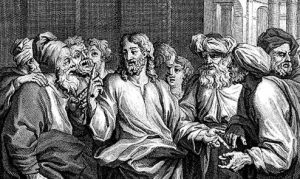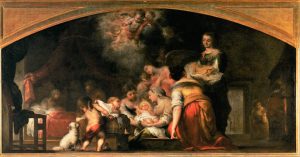
2 September 2018
22nd Sunday in Ordinary Time

Readings at Mass
1st: Deuteronomy 4:1-2,6-8
Ps: 14:2-5
2nd: James:1:17-18,21-22,27
Gospel of Mark (7:1-8,14-15, 21-23)
You put aside the commandment of God, to cling to human traditions
The Pharisees and some of the scribes who had come from Jerusalem gathered round Jesus, and they noticed that some of his disciples were eating with unclean hands, that is, without washing them. For the Pharisees, and the Jews in general, follow the tradition of the elders and never eat without washing their arms as far as the elbow; and on returning from the market place they never eat without first sprinkling themselves. There are also many other observances which have been handed down to them concerning the washing of cups and pots and bronze dishes. So these Pharisees and scribes asked him, ‘Why do your disciples not respect the tradition of the elders but eat their food with unclean hands?’ He answered, ‘It was of you hypocrites that Isaiah so rightly prophesied in this passage of scripture: This people honours me only with lip-service, while their hearts are far from me. The worship they offer me is worthless, the doctrines they teach are only human regulations. You put aside the commandment of God to cling to human traditions.’ He called the people to him again and said, ‘Listen to me, all of you, and understand. Nothing that goes into a man from outside can make him unclean; it is the things that come out of a man that make him unclean. For it is from within, from men’s hearts, that evil intentions emerge: fornication, theft, murder, adultery, avarice, malice, deceit, indecency, envy, slander, pride, folly. All these evil things come from within and make a man unclean.’
Their hearts are far from me
The interior life is primordial… The active life is the consequence of the interior life and has no value unless it depends upon it. We should like to do everything to the best of our ability, perfectly. But if it isn’t linked to our interior life it is to no purpose. All the value of our life and activity stems from our interior life, the life of love for God and the Virgin Mary, the Immaculate: not in theories or sweetness but in the practice of a love that consists in the union of our will with the will of (God and) the Immaculate Virgin.
Above and over all we must deepen this interior life. If it is truly a case of spiritual life then supernatural means are required. Prayer, prayer, and prayer alone is what is needed to undertake the interior life and its flowering. Interior recollection is necessary.
Let us not be anxious about unnecessary things but gently, peacefully, let us try to preserve recollection of spirit and be attentive to God’s grace. That is why silence helps us.
Saint Maximilian Kolbe (1894-1941), Franciscan, martyr
THIS WEEK’S FEASTS
Mon 3 St. Gregory the Great, Pope, Doctor
Tues 4 Holy Moses, Law giver and prophet (Diocese of Jerusalem)
Sat 8 Birth of the Blessed Virgin Mary, Feast
Psalter Week II
Readings for 23rd Sunday OT
Isaiah 35:4-7
Ps 145:7-10
James 2:1-5
Gospel Mak 7:31- 37
Nativity of the Blessed Virgin Mary

The Birth of the Virgin Mary has been celebrated at least since the 5th century and it comes nine months after the Feast of the Immaculate Conception. This feast was sparked by pious traditions, apocryphal writings and opinions of Fathers of the Church. According to some of these, the birth of Mary was obtained by the fervent prayers of Joachim and Anna in their advanced age, Joachim belonging to the royal family of David, while Anna was likely a descendant of the priestly family of Aaron; thus Christ the Eternal King and Priest sprang from both a royal and priestly family. As to the place of Mary’s birth, there are three different traditions, first, Bethlehem, based on a writing entitled “De nativitate Sanctae Mariae.” Second, Sephoris, since under Constantine a church was erected there to commemorate the residence of Joachim and Anna in that place. Third, and most likely, Jerusalem, based on some sermons found among the writings of St. Andrew of Crete (d. 680).
At any rate, if there is much hope and joy at the birth of a child, how much more in the case of of the Blessed Virgin Mary, the Mother of our Saviour. Her coming into the world was the dawn of our salvation, for just as we needed Jesus to be saved, He needed Mary to be born. Mary’s birth is proof of God’s love for us.
![]()
Parish Lunch Next Sunday, 9 Sept, bring and share, all are welcome.
St. Paul’s Apostolates will Resume: SJP2 Children’s Oratory on Saturday 6 October and Bible Group on Thursday 11 October.
Archangel Michael Hospice is having a very busy summer and so we ask for your prayers and support. Thank you.
CARITAS PAPHOS We need help helping the vulnerable in Paphos. Call Wendy 9904 0294. Thank you for your prayers.
Mass Times HERE
